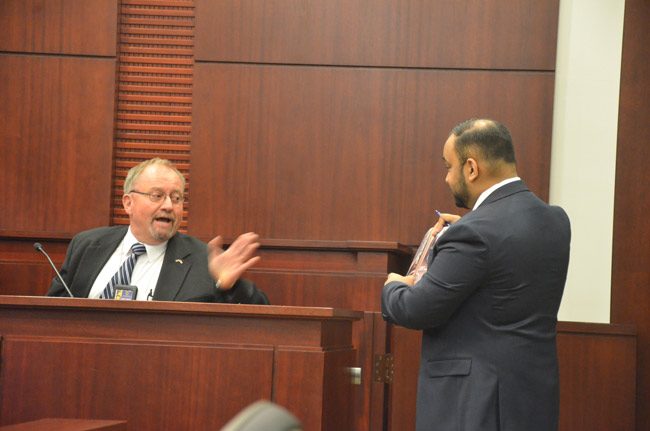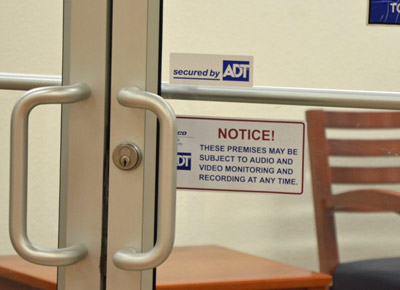
A circuit judge has dismissed four more felony charges in the long-running case against former Flagler County Elections Supervisor of Elections Kimberle Weeks, which started with a grand jury indictment on 12 charges almost two years ago. Last June the judge, Margaret Hudson, dismissed three of the charges. That leaves Weeks still facing five third-degree felony charges.
But Hudson in this latest round ruled against a motion by Weeks’s lawyers to suppress the search warrant state investigators used to search the supervisor’s office. Had she granted the motion, the case against Weeks would have collapsed, since all materials and recordings gathered to make the case against her were the fruit of that search.
Hudson, in a pair of rulings issued March 31, conceded that Philip Lindley, the Florida Department of Law Enforcement agency who filled out the warrant and served it, made mistakes and misstatements along the way, but not willfully so. So the warrant stands as valid.
The case centers on a series of conversations Weeks recorded, either between herself and others or between other individuals, in her office or elsewhere. The conversations were recorded without the knowledge of most of those being recorded. That’s possibly a third-degree felony, under Florida law, depending on the circumstances. The difference is whether those being recorded have a reasonable expectation of privacy or not. In the case of five such recorded conversations adding up to five felony counts against Weeks, Hudson found that expectation of privacy wanting
But she ruled against dismissing five remaining counts, each of which, if Weeks is found guilty, would expose her to up to five years in prison.
Hudson’s ruling erred on the side of openness, giving the person making the recordings—in this case, Weeks—the benefit of the doubt within the scope of Florida law’s definition of privacy, public spaces and public business. “What constitutes a reasonable expectation of privacy depends upon one’s actual subjective expectation of privacy as well as whether society is prepared to recognize that expectation as reasonable,” Hudson wrote.
Weeks’s defense was strongly aided by the fact that at the entrance to her office, pasted on the double-glass doors by the handles, was a notice that began with the words in capital letters and in red: “NOTICE!” then went on, all in smaller capital letters, to note that “these premises may be subject to audio and video monitoring and recording at any time.” The notice was from ADT, the security company.

Hudson pointed out those details as she explained her ruling to dismiss several of the charges—including in the case of a recorded conversation between County Attorney Al Hadeed and County Commissioner Charlie Ericksen, who was an alternate canvassing board member at the time. The two were in the supervisor’s office for a canvassing board meeting. They were in the conference room. The meeting had moved to the adjoining room. Hadeed and Ericksen remained in the conference room, and spoke. They thought they were having a private conversation. But Weeks’s cell phone was recording them all along. And people could come and go into or through the conference room at any point, and likely did.
So whether Weeks was recording Hadeed and Ericksen “secretly” or not did not matter: the two men had no reasonable expectation of privacy, the judge ruled
That’s the conversation that Weeks edited and first played at a heavily attended canvassing board meeting, possibly in hopes of incriminating Hadeed for speaking to Ericksen about a previous county commissioner’s actions on the canvassing board, years before. Those actions may have amounted to a third-degree felony, and Weeks subsequently claimed that Hadeed not reporting them was himself violating the law. That part of the issue is not in the scope of the judge’s decision, nor has it been part of any legal matter since, becoming little more than a pretext in the larger case.
The county administration objected to what it saw as the secret and illegal recording of Hadeed and Ericksen, and the case against Weeks began developing from that point.
But as Hudson noted in her ruling, even Ericksen doubted whether he thought his conversation with Hadeed was confidential. And even though Hudson pointed out that the conversation was taking place in the canvassing board room, within view of Weeks’s cell phone, and with that notice pasted at the supervisor’s front door, she also noted that the conversation took place “in a quasi-public place with other canvassing board members nearby.” In other words, it would not have necessarily taken that notice at the front door to make Hudson’s point: there was no reasonable expectation of privacy regardless.
Had Hudson ruled otherwise, she would have upended the law regarding public spaces and the recording of public events by essentially creating a standard where, in public spaces, the expectation of privacy is presumed until proven otherwise. In public places, however, the expectation is reversed: all is public until proven otherwise. That burden of proof is not light.
The same reasoning applied to Hudson’s dismissal of a count involving the recorded conversation of County Judge Melissa Moore-Stens and FlaglerLive Editor Pierre Tristam, in the same area where Hadeed and Ericksen had been recorded, though after a canvassing board meeting had ended. Moore-Stens and Tristam were having an off-the-record conversation, they were not aware that they were being recorded. But as with Ericksen doubting whether he was having a confidential conversation with Hadeed, Tristam himself, writing last year in an opinion piece about the weakness of all but a few counts in the case against Weeks, said the conversation was taking place in a common area with little expectation of privacy.
The judge also dismissed counts relating to a recorded conversation between Weeks and a Holly Hill cop, on his police-issued phone, in his department-issued car, about public business and matters of public record. And she dismissed the charge that Weeks had illegally played the conversation between Hadeed and Ericksen at a public meeting, since that conversation, now deemed legally recorded, could not have had a different status when played at a public meeting.
Where Hudson did not dismiss was in clear cases where the person being recorded either did not know that a recording was taking place, or was in surroundings reasonably considered private, or, in the case of Secretary of State Ken Detzner (who was with aides at the time), had explicitly told Weeks he did not want the conversation recorded. Weeks recorded anyway. Detzner’s objection, Hudson wrote, “elevated the expectation of privacy for the conference call from the usual business call setting.” (Weeks’s lawyers have argued that even if Detzner had not wanted the conversation recorded, it was about public business in the public setting of his office at his end, with Weeks in her office at hers.)
Hudson also denied the motion regarding a recorded phone conversation between Weeks and Palm Coast Clerk Virginia Smith, who was speaking to Weeks from her office, but also with a reasonable expectation of privacy. The motion was denied also regarding a conversation between a private individual and Weeks on Weeks’s property, and regarding a conversation between Weeks and Assistant Attorney General Gerry Hammond. Weeks also faces a third-degree felony count for playing the recording of her conversation with the secretary of state to her aunt and uncle. The judge did not dismiss that count, either.
The next step in the case before Hudson has yet to be scheduled, but the case is approaching either a trial date or an out-of-court settlement: Weeks’s lawyers have successfully narrowed the case against their client, but their blade may be at its whetting’s end.
![]()
Judge Margaret Hudson’s Order on Motion to Dismiss Nine Counts Against Kim Weeks (2017)
Click to access weeks-order-dismissals.pdf





























palmcoaster says
I want to know why my conversations with any public official are automatically subject to be recorded and why Mrs. Weeks recordings total 12 in the start and now 5 left are deemed illegal. They are all public officials paid by us and for what and why do they have to hide? She did her work and the only error she made was not to request Whistle Blower immunity!
These 2 years of lawsuit against Weeks is a county travesty commanded by Cty Manager, Attorney and the minions we elected to do right for us and instead all waste our hard earned taxes in this Weeks witch hunt!
If you get elected and reveal against the gang in power they will try to destroy you! Why Dentzer, Smith and the others asked for privacy weren’t they doing their work paid by us all…? What privacy are they entitled while in public office? Just a big charade!